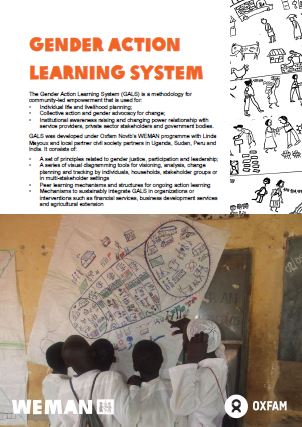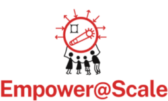HHM/GALS
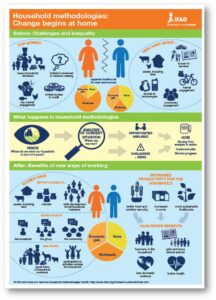
Household Methodologies (HHM)
IFAD is one of the leading development agencies innovating with household methodologies (HHMs) to enable more poor households to be reached and to improve intra-household gender relations. There are several types of HHMs, which vary greatly in terms of scope, cost and duration of the intervention required to support their implementation. Nevertheless, there are some shared features:
- The strength in triggering gendered behaviour change from within the household (often linking to other levels such as the individual, the group, organizational and wider levels);
- Positioning poor rural women and men as drivers of their own development process;
- Three main areas of engagement: the community and the wider environment, the service provider and the facilitator system, and the household;
- Practical elements of visioning, planning, action and review at different levels including the household.
The HHM most commonly promoted by the Empower@scale project is the Gender Action Learning System (GALS) because it has proven to work in many different contexts, with many different target groups and within different thematic areas.
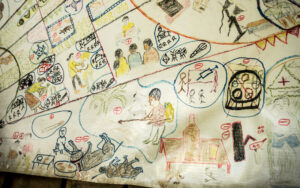
Gender Action Learning System (GALS) GALS is an empowerment methodology that aims at gender justice and improved livelihoods. Anyone can use it to gain more control of his/her life and livelihood, no matter the education level, literacy, employment status, age, social or gender identity. It can help to envision the future, plan life and livelihood, improve relationships with others and expand the social network. In a group or an organisation it can help to relate meaningfully with others across perceived differences in status and power. The methodology consists of:
- A wealth of instruments and visual diagramming tools for individual and collective change planning, analysis, awareness raising and actual behaviour change, group strengthening, advocacy, review and reflection;
- Specific universal principles on gender justice, empowerment and participation;
- Peer learning mechanisms and structures for ongoing action learning in communities;
- Ways to integrate gender action learning into projects, interventions and different themes.
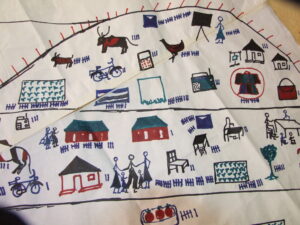
GALS builds on the Participatory Action Learning System (PALS) and several other participatory methodologies. It was initially developed by Linda Mayoux with Bukonzo Joint Cooperative Union and champions in Mwana Mulho and other affiliated organisations in Uganda since end of 2007, with inputs from PALS experience in Sudan, India and Pakistan. This took place under Oxfam Novib’s Women’s Empowerment Mainstreaming and Networking (WEMAN) programme. From 2007 WEMAN worked with partner organisations in Latin America, Asia and Africa funded by Oxfam Novib with support from the Dutch Ministry of Foreign Affairs, the International Fund for Agricultural Development (IFAD), the European Union (EU) and other donors. Since then it has been part of many initiatives for example triggered by IFAD and Hivos. The main trainers are community members themselves based on self-interest and business cases to change gender relations and norms. The tools are also used by cooperatives and other value chain actors and by organisations, enabling them to change gender and power relations that constrain them from achieving their visions.
More information about HHM and GALS can be found in the Resource Centre.
